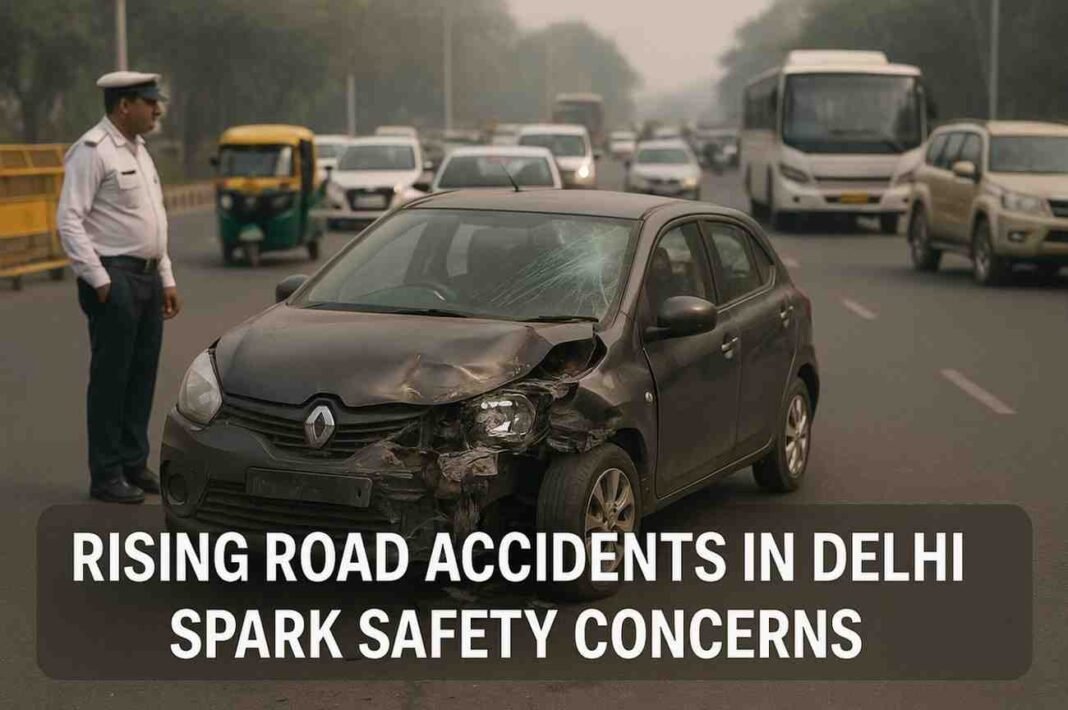Fatal Crash on Parliament Street Raises Alarm
New Delhi witnessed yet another tragic road accident on Monday morning, further fuelling public anxiety about road safety in the capital. Around 8:30 AM, a young man named Deepak, aged approximately 25, lost his life after an SUV rammed into his motorcycle in the high-security Parliament Street area.
According to a senior police official, Deepak suffered critical injuries when the car hit his two-wheeler. He was immediately rushed to a nearby hospital, but doctors declared him dead on arrival. The identity of the car driver has not been disclosed yet, and an investigation is currently underway to ascertain the exact cause and accountability behind the incident.
This latest mishap has once again brought the spotlight on the alarming frequency of road accidents in Delhi, raising questions about how safe roads really are for daily commuters — especially in zones considered high-security or low-traffic.
Accidents Becoming a Daily Reality in Delhi
Road safety has become a growing concern in Delhi as incidents of crashes and fatalities continue to rise. According to recent data from the Delhi Traffic Police, the city sees thousands of accidents annually, with a significant portion leading to serious injuries or death. Reckless driving, over-speeding, signal violations, and poor lane discipline remain among the leading causes.
While it’s easy to attribute every accident to chance or driver error, there’s a systemic failure involved too — inadequate enforcement of traffic rules, poor infrastructure maintenance, and lack of public awareness contribute heavily to the rising toll.
Why People Feel Unsafe – Even on the Road
A particularly disturbing trend is that many people now fear commuting, whether on foot, by two-wheeler, or in cars. If public areas such as Parliament Street — guarded and central — are not safe, the sense of insecurity spreads citywide. Many citizens argue that if they’re not even safe on the roads, how can anyone expect to feel safe anywhere in Delhi?
This fear is further compounded by the unpredictability of accidents. One may be following every rule but still fall victim to someone else’s negligence. Hence, it’s crucial to take a dual-pronged approach: empowering citizens with road-safety knowledge and implementing stringent regulations to ensure compliance.
Safety Measures Every Citizen Should Follow
While the responsibility of road safety cannot lie on individuals alone, there are several steps common people can take to reduce their risk:
-
Wear Helmets and Seatbelts: Non-negotiable for both drivers and passengers.
-
Avoid Distractions: Do not use mobile phones while driving or walking on roads.
-
Follow Traffic Rules: Always obey signals, lane markings, and speed limits.
-
Use Pedestrian Crossings: Avoid jaywalking, and always look both ways before crossing.
-
Stay Alert in High-Traffic Zones: Exercise extra caution near junctions, flyovers, and bus stops.
-
Check Vehicle Condition: Ensure brakes, headlights, and indicators are functioning properly before hitting the road.
What the Government Can and Must Do
Tackling road safety isn’t just about urging people to drive better — it’s also about structural reforms. The government must act with urgency on several fronts:
-
Stricter Law Enforcement: Install more traffic cameras and increase on-ground policing to penalize violators.
-
Road Infrastructure Audit: Identify accident-prone areas and fix potholes, faulty signals, and confusing signage.
-
Public Awareness Campaigns: Launch sustained education programs across media to promote safer road behavior.
-
Mandatory Driver Training: Ensure all drivers undergo rigorous and standardised training, especially for commercial licenses.
-
Tech Integration: Encourage the use of advanced traffic monitoring systems using AI and GPS for real-time accident prediction and response.
-
Speed Control Zones: Create more speed-restricted zones near schools, markets, and residential areas.
A Collective Responsibility
While Deepak’s tragic death may be counted as just another statistic in the city’s accident log, for his family, it’s a devastating and irreplaceable loss. His passing should not go in vain — it should serve as a wake-up call for everyone, from citizens to policymakers.
Delhi needs to evolve into a safer city not only in terms of crime but also on its roads. Everyone — whether walking, riding, or driving — deserves to reach their destination safely. Road safety is not a privilege; it’s a right that must be protected at all costs.








